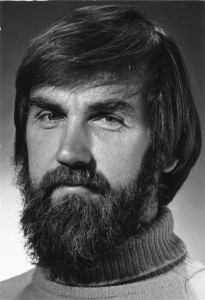
The Kalamazoo College community is saddened to learn of the death of Professor Emeritus of Physics David Michael Winch, age 78. David, of Taos, New Mexico, passed away unexpectedly October 7, 2013 while riding his bicycle. David taught at the College from 1967 to 2001. Before coming to K he taught at John Carroll University, Clarkson College of Technology, the United States Air Force Academy, and British Open University. He conducted research for the National Aeronautics and Space Administration, the Argonne National Laboratory, and the Desert Research Institute.
Winch was an enthusiastic bicyclist, and was often seen on campus on his bicycle. He usually biked the 13-mile round trip from his home to K. He also loved the out-of-doors, especially mountains, and he co-founded the College’s popular LandSea wilderness first-year orientation program.
In addition to physics, he was deeply involved in science education at all levels. He believed that science is best learned using a hands-on approach, and he believed that science is best learned through collaboration and group work. He was a founding board member of the Kalamazoo Area Mathematics and Science Center, a magnet school for gifted high school math and science students in Kalamazoo County. He also was a teacher and director with ScienceGrasp, a national program that encouraged elementary school teachers to use hands-on science teaching strategies in their classrooms. During his career he received more than $2.8 million in grants on behalf of science education, and he published more than a dozen articles and presentations on physics education for various learning levels. In one of those publications he wrote, “An infant reaches for a brightly colored object; tiny fingers squeeze the object, exploring its shape and texture. The infant shakes the object to see if it rattles and almost certainly puts the object in her mouth. She uses all of her senses to experience the sizes, shapes, colors, sounds, and textures of her world. A child is naturally curious and begins at an early age the lifelong business of learning about this world in which we live. This innate curiosity is perhaps most evident during the period of human development marked by the question ’Why?’ It can be frustrating to deal with a child who wants to know ’why,’ yet it can also be refreshing to have renewed contact with this childlike curiosity. Science tries to answer the ’why’ of the physical world. It is a grand journey, guided by a myriad of questions and a few answers. We, as teachers, are guides in this journey of exploration.” Winch said that the most important element of his pedagogy was to “ask questions and then keep quiet,” and he noted the difficulty of the latter for teachers. And yet the duration of the period of silence following a question, said Winch, is (to paraphrase an aphorism about teaching often ascribed to Socrates) the difference between kindling a flame and filling a vessel.
After moving to Taos in 2002, he served as president of the Upper Las Colonias Neighborhood Association. He loved Taos. He also loved skiing, kayaking, canoeing, He is survived by his wife, Suzanne Winch; children, Michael Winch, Janet McBarnes, Martin Winch, Douglas Winch (Lisa), Kenneth Winch, Robert Kuiper, Shelli Kuiper, Joseph Kuiper (Kim); and 11 grandchildren, two great-grandchildren, many other family and friends. A memorial service in New Mexico will be held at a later date. In lieu of flowers, please make a donation to C.A.R.E. or the American Red Cross.
A memorial service for David will be held Sunday October 20, 1:30 p.m., in Stetson Chapel on the K campus followed by a reception in the Olmsted Room, Mandelle Hall. An obituary appears in the Kalamazoo Gazette.

